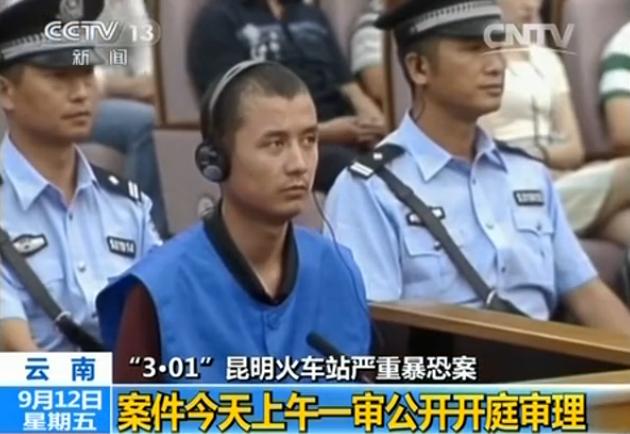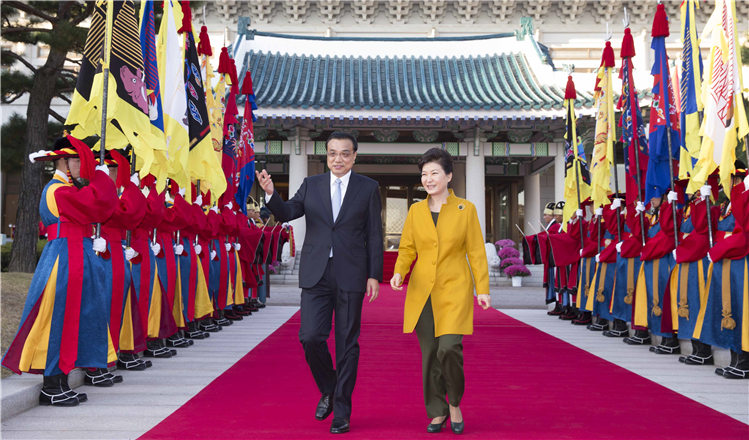Criminal Law amended to combat terrorist activities
Updated: 2015-11-02 07:51
By CAO YIN/CUI JIA(China Daily)
|
||||||||
 |
|
Screen shot from China Central Television's news program shows a suspect of the Kunming train station terrorist attack sitting in the intermediate court of Kunming, the capital city of Southwest China's Yunnan province in this Sept 12, 2014 file photo. [Photo /screen shot from China Central Television] |
Five new charges related to terrorism have been added to the Criminal Law in China and took effect on Sunday.
The charges-the ninth amendment to this law-have been introduced after top legislators discussed terrorist attacks carried out nationwide in recent years.
The new charges are: Preparing a terrorist attack, inciting terrorism, using extremism to break the law, wearing clothing or logos associated with religious extremism, and illegally possessing goods to carry out terrorist activities.
Ruan Chuansheng, a criminal lawyer in Shanghai, said the additional charges reflect lawmakers' determination to combat terrorist attacks at the planning stage.
"The new charges are a sign that the Criminal Law has become tougher for terrorists and that the fight has moved forward to prevention from cracking down," Ruan said. "It's good to highlight prevention, because it is the core of the legislation.
"The amendments concerning clothing and preparation will help to target related crackdowns and show that our legislators have reacted quickly to public concern," the criminal lawyer said.
Ma Pinyan, a researcher at the Xinjiang Academy of Social Sciences, applauded the new charges, saying they will be help with work to combat terrorism in the Xinjiang Uygur autonomous region.
The region, home to more than 51 percent of China's Muslim population, has seen several terrorist attacks in recent years, which have spread to other areas of the country.
To combat religious extremism in accordance with the law, Xinjiang authorities passed a revised regulation on religious affairs, which took effect in January. This banned people from wearing or forcing others to wear clothing or logos associated with such extremism.
But Ma said this local regulation was far from sufficient as administrative methods, such as education, to combat extremists in the past had not worked well.
"The key to fighting terrorist attacks is to root the extremists out, so I'm glad to see the revised Criminal Law has highlighted this. The law also provides us with the legal basis to fight extremists, and I believe it will be more effective," he said.
- Insurance for caring services sought in rapidly aging capital
- Criminal Law amended to combat terrorist activities
- Swimmers battle against the cold in ice-covered river
- Silent disco yoga class in HK quiets body and mind
- Endangered storks flock to reserve in record numbers
- Green victory in court seen as setting trend

 Chinese go the distance for marathon
Chinese go the distance for marathon
 First made-in-China large plane rolls off assembly lines
First made-in-China large plane rolls off assembly lines
 Mega projects undertaken in 2011-2015
Mega projects undertaken in 2011-2015
 The world in photos: Oct 26 - Nov 1
The world in photos: Oct 26 - Nov 1
 Art installations brighten Shanghai subway
Art installations brighten Shanghai subway
 Radwanska masters art of finishing on a high note
Radwanska masters art of finishing on a high note
 Nanjing Chamber of Commerce sets up in Silicon Valley
Nanjing Chamber of Commerce sets up in Silicon Valley
 South Korean President welcomes Premier Li Keqiang
South Korean President welcomes Premier Li Keqiang
Most Viewed
Editor's Picks

|

|

|

|

|

|
Today's Top News
Tu first Chinese to win Nobel Prize in Medicine
Huntsman says Sino-US relationship needs common goals
Xi pledges $2 billion to help developing countries
Young people from US look forward to Xi's state visit: Survey
US to accept more refugees than planned
Li calls on State-owned firms to tap more global markets
Apple's iOS App Store suffers first major attack
Japan enacts new security laws to overturn postwar pacifism
US Weekly

|

|






